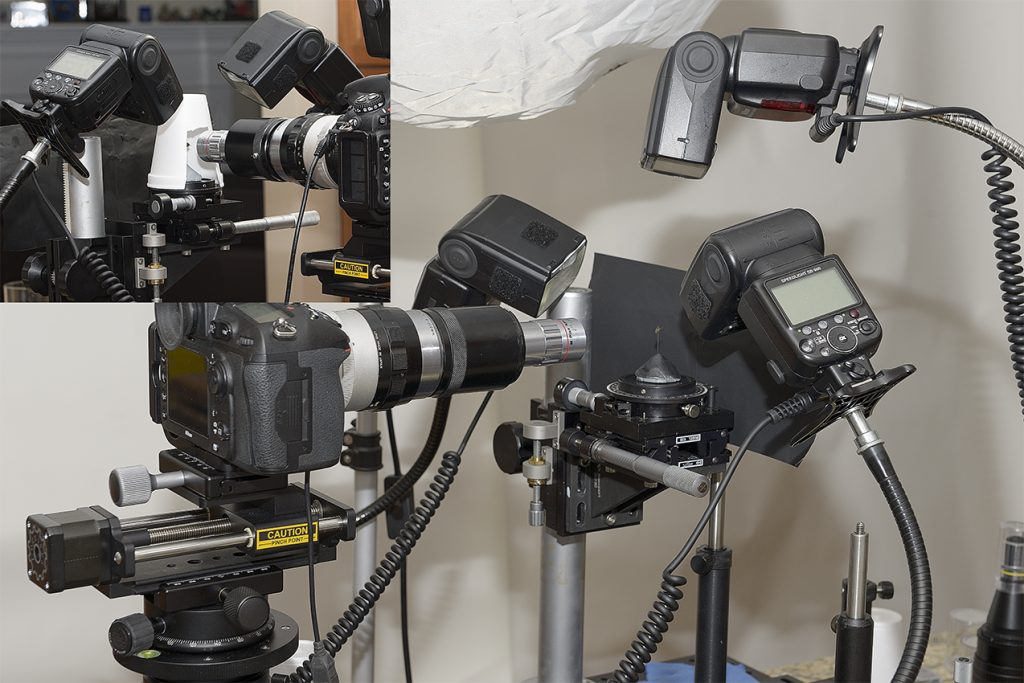Extreme macro photography is generally accepted when photos are taken above a magnification of 5X ,ie five times magnification. Normal macro photography is usually pursued using off the shelf macro lenses giving a max of 2:1 magnification using various adaptations of lens extension and reversing lenses.. But going above a 5:1 magnification entails the use of microscope objectives because normal camera macro lenses are not designed for those extreme magnifications. They suffer from refractive errors, chromatic aberration and edge sharpness and other aberrations if pushed beyond their design magnification.
Extreme macro photography of insects is one of the most popular types of photography. Extreme macro photography is accomplished with a photo stacking software where about 100 photographs are stacked to form one sharp image by clever software like Helicon focus and Zerene stacker. Photoshop is unable to do a perfect stack like the above two software. The algorithms of the mentioned software do a better job than photoshop .Photoshop is ok for amateur stacking.
At 10X.. ie 10 time magnification and a Numerical Aperture of .25 of the Nikon microscope objective that has been used in these photographs, the DOF ie depth of field is only about 9 microns.!! So a series of perfectly aligned photographs have to be taken of the subject. It is impossible for a human to move the camera about 5 microns each step exactly so that the DOF may overlap each other. This is to help the stacking software to do a perfect stack. So to move the camera assembly 5 microns each step, a computer controlled stepper motor moves the rail assembly with the camera and lenses in precise steps as needed. These steps can be programmed at the start of the shoot as each magnification needs a different step length .Vibration is another factor that has to be taken into consideration and the whole set up should be vibration free as possible . A washing machine running in the next room is enough to induce vibration that will make the pictures soft.
Two flashes or more with diffused light are used to light the subject . Diffused light is of utmost importance to get a perfectly lit photographs without specular high lights. Usually a DX sensor size camera is used, as the image on a full size camera sensor is not good on the edges of the image.
The lenses generally used are microscope objective lens from Nikon and Mityutoyo. Mityutoyo makes the best lenses for this genre of photography. These objectives are attached to the camera body by an extension tube or bellows according to the focal length of the objective lens and a tube lens is used in between to focus the image on to the sensor of the camera.
The process goes like this . First a series of photographs ie about 100 or more are taken, usually in RAW format and processed in a batch file to correct for exposure , noise , and other defects. Then the corrected photo graphs are loaded into a stacking software like zerene stacker or helicon focus. These software stack all these photographs in to one picture that has a larger depth of focus. This photo is then imported into light room to do basic correction of white balance , exposure, level, curves, color balance and sharpness etc . It can be saved in Tiff or any other non destructive format. Finally the picture is imported into Photoshop for final correction like removing dust specks that are usually present , cloning some small detail, color correction, increasing the contrast, saturation, and finally sharpness if needed. This can be saved as a PSD file or a JPEG file for display on a computer. Needless to say it is a time consuming process that would take 6hrs from the time of shoot till final image out put to get a photograph ready. There are many pit falls that can happen during the process. The reward is commensurate with effort in the final photo graph.!
There are only a hand full of photographers in India that are pursuing this extreme macro photography to my knowledge.
